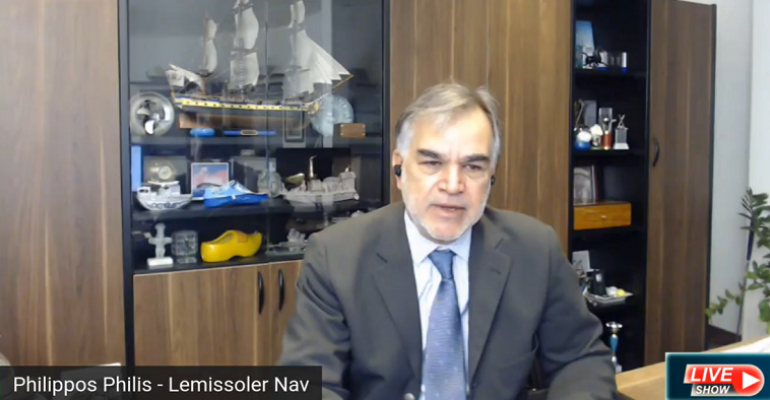Ahead of the European Commission’s open public consultation on the matter, various public authorities in Cyprus including the Shipping Deputy Ministry banded together to organise the event in order to explore implications of such a move.
The discussion between regulators, shipowners and NGOs was entitled "ETS in Shipping: Elixir or Threat to Sustainability? Participants included the CSC (Cyprus Shipping Chamber) president and ECSA (European Community Shipowners’ Associations) vice-president Philippos Philis (pictured), speaking in his personal corporate capacity as chairman and ceo of Lemissoler Navigation Co, and the session was moderated by Vassilios Demetriades, Cyprus Shipping Deputy Minister.
Philis highlighted the risk of undermining IMO negotiations to implement the initial IMO strategy, so setting back global efforts made so far to adopt measures for absolute emissions reduction from ships
Demetriades explained: “For Cyprus, it is vital that stakeholders from across the maritime industry engage collaboratively with regulators and NGOs alike. This is why we want to facilitate dialogue that provides a collective response to the European Commission’s public consultation regarding its proposed ETS, rather than simply submitting our own views.
“We must seize this opportunity to ensure that all affected voices are heard, working collectively towards the best possible outcome. It is essential that maritime transport makes a meaningful contribution to climate change while at the same time safeguarding its competitiveness. We hope that the seminar will help to provide the Commission with greater clarity on the best way forward.”
CSC provided a summary of some concluding remarks to this “very constructive discussion” as follows:
• It is uncertain that an EU ETS will be effective in further reducing GHG [Greenhouse Gas] emissions from ships beyond what the International Maritime Organization (IMO) is regulating. The EU system will certainly lead to carbon leakage. The IMO is the only body that can effectively regulate and achieve emissions reductions from shipping.
• An EU ETS will affect the viability of shipping SMEs (Small and Medium sized Enterprises), which form the backbone of EU shipping, by adding to their administrative and budgetary requirements and forcing cargo back to more polluting transport means ashore.
• Any system introduced by the EU must be IMO compatible and scalable in the future, but even better the EU should cooperate with the IMO to introduce a global system.
Taking the above into consideration, the CSC adds its own voice to the debate by highlighting “the risk of undermining IMO negotiations to implement the Initial IMO [GHG] Strategy, so setting back global efforts made so far to adopt measures for absolute emissions reduction from ships.”
Copyright © 2024. All rights reserved. Seatrade, a trading name of Informa Markets (UK) Limited.
Add Seatrade Maritime News to your Google News feed.  |

